Episodes
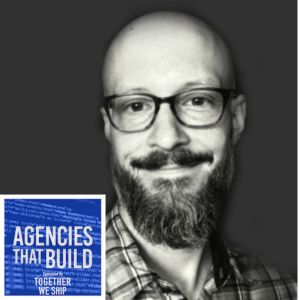
Friday Jul 14, 2023
Friday Jul 14, 2023
In this episode, we are joined by Benjamin Morris, Chief Delivery Officer & Co-owner at Pluribus Digital. With extensive experience in government collaboration, Ben is a seasoned professional well-versed in navigating the complexities of working with government agencies. He is passionate about driving impactful change in the public sector and offers valuable insights into strategies, processes, and best practices for successful collaborations between government entities and external partners.
Discussion Points -
What sort of bogus strategy, or misconception do you want to set the record straight on? 1:59
What led Pluribus Digital to specialize in the government sector? Could you share a brief overview of your journey and any key experiences that influenced your company's focus on government-related projects? 3:26
How does the business process of working with technology in the government sector typically operate? Could you shed some light on the types of approvals or processes involved in an agency like yours, and how you navigate them? 5:16
What's the team structure in government tech projects? Explain the project lifecycle, challenges, and opportunities when working with government agencies.13:26
How hard does the government negotiate on pricing? 20:38
What was the motivation behind starting a nonprofit organization consisting of a select few companies driven to accelerate the government's digital transformation? 26:31
Tell us a little bit about the trucking and traffic management industry. 30:27
What’s your perspective on AI? What’s the government doing with it? 33:18
Could you provide insights into the company policies or checks in place that strike a balance between utilizing AI for learning and innovation, while avoiding potential risks and safeguarding sensitive information? 37:48
Where do you hang out and talk about and discuss the best practices in the government space for the agencies? 40:57
What are you looking forward to? 43:34
Show notes -
The process is pretty standard to be operating in Agile methodology, you have something like a scrum flavor of Agile, that's the mainstream of government right now. 11:55
Sometimes the government can move a little bit slower, but often, that's for very legitimate reasons. Because you're not just talking about “let's improve this process or something else”, you're talking about “Hey, maybe we need to consider a policy change or work with a wider stakeholder group to get that bigger thing done”. 16:53
If you hear about big government project failures, it's probably because the policies are maybe a little too convoluted. And then you're trying to build a solution that meets all the requirements of a somewhat convoluted policy. And if you could only do some small things to simplify the policy, then you could make everything just work better, cost less and be simpler for people to use. 18:08
One of the programs that we support is login.gov. And, that is a mechanism for people to log in and gain access to services. So you can't just say, “Oh, well, let's not worry about that, the 1% over in this corner”, you have to find some way to service those people. 24:23
There's a lot of excitement in government, certainly a lot of signals about using AI in various government use cases. And so that we see that as a need, something that our customers are asking for, and something that we've had a chance to apply in some areas. 33:56
There's also the defensive side of it (AI), how might it be used or misused in interactions with the government? So if someone is filling out an application for benefits, and there's some kind of written description portion, then there may be issues if there may be ways to use Chat GPT, that would not be ideal. It could be a tool for fraud or other things. 39:09
People value coming together and, just engaging as owners in practical professional support groups and sometimes almost like an emotional support group. 42:48
That's really that open space now. How can we not just have technology in government or automate some things, but how can we make things much more natively digital and therefore, scalable and fast and cheaper to operate, and more reliable? 44:17
Myth-Busted - Government and technology are either super advanced with futuristic interfaces or stuck with outdated systems.
Links -
LinkedIn: https://www.linkedin.com/in/bengm/
Company’s LinkedIn: https://www.linkedin.com/company/pluribusdigital/
Company website: https://pluribusdigital.com/
Show Credits -
Host - Varun Bihani & Jessie Coan
Produced by Bobby Soni
Edited by Priyanka Sharma
Content by Aakash Damani, Yashika Neekhra, and Juhie Bhardwaj
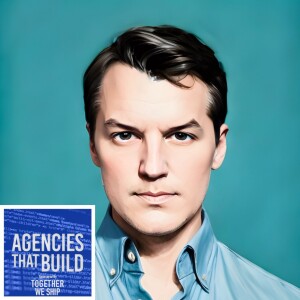
Friday Jul 07, 2023
The Many Hats of PMs in Digital Agencies - TJ Pitre - S2 Episode#11
Friday Jul 07, 2023
Friday Jul 07, 2023
In this episode, we are joined by Mr. TJ Pitre, the founder, and CEO of Southleft, LLC, a leading front-end application design and development agency. With two decades of experience in managing and designing large-scale responsive websites, TJ is an expert in executing front-end strategies with a mobile-first approach. Join us as we delve into his creativity, attention to detail, and unwavering commitment to delivering exceptional user experiences.
Discussion Points -
Q1. What is the most difficult thing you have done in your life? 1:55
Q2. What sort of myth bogus strategy misconception would you like to set the record straight on? 14:44
Q3. Do you personally check in with all clients or is it selected clients? 22:37
Q4. How do you ensure that the relationship specialist effectively manages all accounts and fulfills their responsibilities? Do you have specific metrics or a scorecard in place to measure their performance and ensure no account is overlooked? 28:01
Q5. You mentioned your PMs who play the role of business development. How do you train them? How do you guide them to think from that perspective of growing the business? 34:17
Q6. How do you guys internally support that PM’s growth? 40:09
Q7. Tell us how you started this agency. How did you get into this, a little bit about your background? 42:56
Q8. Where do you spend your time to find the next shiny object that you have always been looking for? 51:34
Q9. What is exciting you about the future? 55:37
Show notes -
A lot of the ways that our business grows isn't through outbound marketing, like cold calls or anything like that, or social, it's usually through projects that we already have now. 23:47
Everybody who's involved in that project gets a taste of who the producer is, and who the business relationship specialist is, so it shouldn't be any surprise if they(clients) hear from either of those people throughout the whole project. 26:58
The role (relationship specialist) is 25% strategy and 75% of tactical work, in a lot of that tactical work like checking the boxes to make sure all these things are done in a recurring fashion. So there's always going to be things that are occurring in projects while the projects are happening. I'm always very conscious of burnout with this person in particular. But there's never any shortage of things to do. 28:14
There's this long list of leads that we have that we'd like to get out to in two or three weeks, And these aren't AI-generated, these aren't templated things or anything. These are legitimate people who we've met or know from our past, and then we always write them a heartfelt email with the goal is to have zero sales pitch in it. 30:52
Our secret is to invest in your PMs. PMs can do more for you than what you would think that they could do. 35:01
Good PMs have emotional awareness in technical aptitude, they understand the intricacies of what a software development lifecycle is. 35:22
There are courses that we start at the very lowest level, and that's usually a part of everybody's goal, including developers. We use these courses called Star 12 courses, and we enroll the whole team and then we add a couple of goals to their gusto. 40:22
Hire yourself a consultant, enterprise level, seasoned 30-year vet of product management, and then do a three-month engagement and have them work on your team and then examine your workflows or have interview each pm recognize their strengths and weaknesses. 41:24
Year over year, we've grown both by personnel and finances, and it's been a great ride ever since it's definitely had its ups and downs. But, I'm happy with the progress. 51:11
We're not using AI, as a part that's taking other people's jobs or taking over our jobs, what we're doing is using it to enhance things that we're currently doing. 56:22
Myth-Busted - It’s necessary to have a tier of account management in a design and development agency.
Links -
LinkedIn: https://www.linkedin.com/in/tpitre/
Company website: https://southleft.com/
Company Linkedin: https://www.linkedin.com/company/southleft-llc/
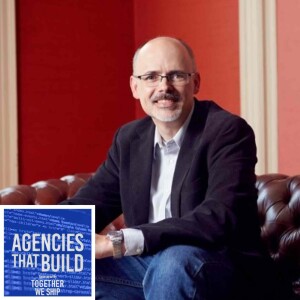
Friday Jun 23, 2023
Friday Jun 23, 2023
In this episode, we are joined by David Poteet, President of NewCity, an interactive design agency. With nearly three decades of expertise in human-centered design, strategy, and user experience, David is a visionary leader driving innovation and excellence. His passion for teaching and coaching, coupled with his captivating public speaking skills, has made him a sought-after conference speaker.
Discussion points -
Q1. What is the bogus strategy, myth, or misconception that you would like to set the record straight on? 1:55
Q2. How do you define human-centered design? 5:37
Q3. As an agency, how do you approach conducting research and incorporating human-centered design into your process? Can you open up the wizard curtain? 10:16
Q4. What type of work have you focused on while using a human-centered approach? Has that made any difference to you? Has it helped you in your positioning? 18:00
Q5. How did you structure your team together? 25:27
Q6. How do you ensure effective communication and cohesiveness between your strategists and engineering team during the feedback and review process before presenting the solution to the client? Are there one or two tools that you have found? 29:17
Q7. How do you find the balance between making sure your team is learning the new technologies and also being productive at the same time? 36:15
Q8. How do you figure out what works for you? 42:36
Q9. What’s exciting you about the future? 49:26
Show notes -
Part of the practice of human-centered design is learning how to conduct research in a way that you get enough insights from a cross-section of your user base that you can triangulate a solution that is going to be the optimal solution for the most people that you're serving. 6:37
The people who are naturally better at human-centered design are the people who have some direct interaction with a customer on a regular basis. 7:55
We do one of the exercises that is called the ad hoc personas. So, we create personas that are based on what the leaders within the organization think they know about their customers. 11:31
It was an uphill climb for a while to persuade institutions to invest in research. 21:43
Along the way, we recognized how much people wanted to have more of a seat at the table and be involved in that process. 26:56
A lot of the innovation happens as you build, you're figuring things out, you're realizing things that do or don't work, you're coming up with new ideas, and it continues to evolve.
We've designed experiences that the team has at key junctures in the project, where you bring people together intentionally to make sure everyone's fully engaged and is really picking things and thinking together. 27:27
We've got a lot of tinkerers on the team, people that do like to try to figure out a better or faster way to do something. 37:41
One of the challenges that you have, as any business owner, is that you will see all kinds of different models and approaches to doing the work. 42:58
We are trying to bridge these two worlds - what's happening in digital and what's happening in the real customer service experience, bringing that expertise together and helping teams bridge and create a real-life and digital melding of strategy. 50:14
Myth Busted - Brand strategy and digital experience are separate entities and can exist independently.
Links -LinkedIn: https://www.linkedin.com/in/davidpoteet/
Company website: https://www.insidenewcity.com/
Twitter: https://twitter.com/davidpoteet
Instagram: https://www.instagram.com/davidpoteet/
Show Credits -
Host - Varun Bihani & Jessie Coan
Produced by Bobby Soni
Edited by Priyanka Sharma
Content by Aakash Damani, Yashika Neekhra, and Juhie Bhardwaj
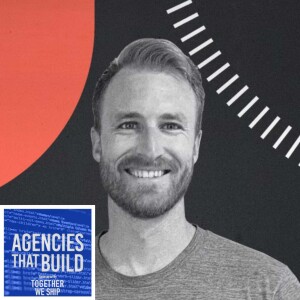
Friday Jun 02, 2023
Friday Jun 02, 2023
Eric Ressler, the Founder & Creative Director of Cosmic, is an entrepreneur with a creative bent and a proponent of sustainability. In 2012, he founded Cosmic, a pioneering firm in the sustainability sector that works with clients to create powerful branding and marketing strategies that advance sustainability and spark positive change. Prepare to be inspired by Eric's innovative approach to merging creativity and sustainability for a brighter future.
Discussion Points:
Q1. What sort of myths, bogus strategies, or misconceptions would you like to set the record straight on? 1:35Q2. What are nuggets for successfully implementing a 4-Day Workweek in an agency? Tips for people who want to get started with it? 7:11Q3. How do you effectively manage and set expectations for upcoming talent within the agency? 14:06Q4. What are the tech-stack do you use to manage internal work processes? 18:59Q5. How do you establish your pricing model with clients? 22:08Q6. Could you share insights about your agency's niche and how you established it? 27:57Q7. What are some of the challenges you have faced as an agency? 34:01Q8. How do you stay on track and ensure you're not missing out on important tasks as agency owners? 40:23Q9. What excites you about the future? 45:52
Show notes:
Creativity is something that you can't brute force. You can grind, hustle, and push hard for a certain amount of time, but you also need time to rest, rejuvenate, and reflect on real life, where you draw inspiration from. 2:49
It's more helpful to come fully prepared, fully rested, and fully creative each day during a four-day workweek, rather than working five, six, or seven days a week and functioning at only 60%, that's not beneficial. 6:16
Deadlines and tight turnarounds are not deal breakers for a four-day week. It's about ensuring each team member shows up at their best every day. 12:31
I don't think a four-day work week necessarily will work for every organization. I think it'll work for 90-plus percent of agencies. 11:15
We work with clients in sprints, breaking down projects into weekly cycles with key deliverables, goals, and success metrics. We present sprint reviews, gather feedback, and work in iterative cycles. 19:24
We'd been an agency for about seven years, and we'd been doing a lot of work with startups, b2b brands, and b2c brands near Silicon Valley in Santa Cruz at the time we were working out of an office. 29:40
We've also just found that the types of clients that come to us need more of a holistic partner, they don't want to hire us just for one thing, and then have to find other agencies to do other parts. 32:30
Building expertise happens through doing enough work for similar clients that you start to see patterns, and you start to understand more about that space than any other agency working in general. 36:57
I go into deep learning mode, devouring books, podcasts, and articles, seeking answers, inspiration, and ideas. 42:19
Change can be scary, but it can also be interesting and lead to more just and equitable ways. 47:09
Myth Busted - One needs to work long hours and give up their personal life in the agency business.
Links - LinkedIn: https://www.linkedin.com/in/cosmiceric/Company website: https://designbycosmic.com/
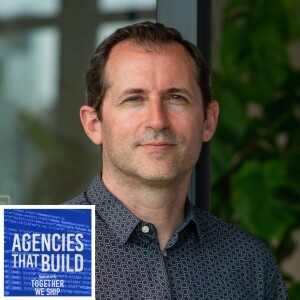
Friday May 26, 2023
Friday May 26, 2023
Guillaume Buat-Ménard, Director of Digital Transformation at Flipside Group is a formidable force in the field of technology. He is a digital strategy and business development expert with over 27 years of experience. With a sharp mind and endless curiosity, he is leading the digital revolution and shaping the future of technology.
Discussion Points -
Q1- What sort of myth or bogus strategy or misconception you'd like to set the record straight on? 1:46Q2- Are there tips along the way that you've learned, on specifically generating leads for PPC? 4:57Q3- When do you start the PPC campaign, how long do you continue that specific niche that you're trying to promote? 14:31Q4- Are there any tools, any tactics that you use to understand the pain points? 19:02Q5- How is your organization structured? 22:17Q6- How do you deal with a cost adjustment when you’re the research piece of it? 30:53Q7- Give some tidbits on how you keep the sales and account management team incentivized and motivated. 39:26Q8- What's exciting you about the future? 43:29
Show notes -
You don't have to do one campaign about your agency, you can have, like we do, several campaigns running on several different things and services. 12:56
As agencies, we don't use our power enough, and more often than not digital agencies.14:45
We always talk about UX, right? What is that? Well, it's looking at a problem from the user's perspective, but not looking at what we can sell them. 14:54
So, rather than look at the technology, everybody's going to bid on that saying we can help you with these specific things. 17:54
These leads, they're not cheap, they will cost you, some of them will cost you 10s of pounds, sometimes or hundreds of pounds to come to your page. So you've got to work that will make that work very hard. 18:26
Technology changes and so on, but ultimately it’s still about people solving problems and so on. 20:25
Clients don't necessarily get to speak to someone, you know, knowledgeable about a very specific subject early on. And that's a problem for creating trust. 23:55
But we just dish out advice, and counsel straight away. It can be a startup, could be an agency. We don't mind, we don't keep our knowledge in a box and try to give a big presentation, that doesn't help people. Right, what they want is actually an answer. Can you help me? Yes, we can help you. 26:42
People are looking for a problem to be solved, right? If you solve it, or you partially solve it straightaway, already gives them a sense of they've got the agency, they're here to help. 29:19
So you've got two types of clients. Of course, those who know they need a discovery, actually. So that's the easy part. And those who don't know. 31:20
In the marketing space, particularly big brands are not always the ones that get paid the most, b2b tends to be actually much, much more lucrative. 34:54
So it's more about how we can help everybody do well, and get the company to do well because when the company does well, we'll do well. 43:12
Myth Busted - Agencies follow what they advice their clients
Links -
LinkedIn: LinkedIn: https://www.linkedin.com/in/buatmenard/
Instagram: https://www.instagram.com/gbuatmenard/
Company website: https://flipsidegroup.com/
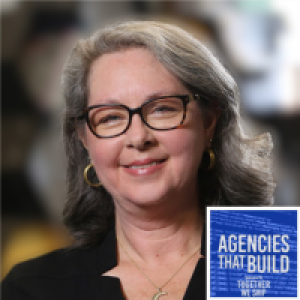
Friday May 19, 2023
Friday May 19, 2023
Sheila Burkett, an accomplished entrepreneur and technology expert, serves as the Founder and CEO of Spry Digital. With an impressive track record of over 35 years in the tech industry, she has emerged as a revered leader in the digital realm, empowering organizations to leverage technology for exponential growth. Sheila's guidance has propelled Spry Digital to become a trusted partner for clients spanning various sectors.
Discussion Points -
Q1. What are your thoughts on Chat GPT? 2:35Q2. What sort of myth or bogus strategy or misconception do you want to clear up? 7:16Q3. How do you make the partnership work? How do you manage the friction? 8:14Q4. What is your profit sharing model that you use internally with employees, can you talk us through a little bit? 13:43Q5. What inspired you to have the profit-sharing model? 17:24Q6. What does your agency specialize in? What is your superpower? 26:10Q7. How do you manage when clients don't deliver? 29:07Q8. Tell us a bit about your race car history. 32:37Q9. What motivated your decision to shift from racing to agency? 36:26 Q10. Where do you get your learning about the industry and the agency space? 38:17Q11. What's exciting you about the future? 40:43
Show notes -
As knowledge workers were going to have to solve the tougher problems. So what chat GPT will do is it will take the easier task away. So we're solving deeper, harder problems. 6:08
We all run into the more diverse personalities and learning styles that you have, which is great. 12:40
I wanted a mechanism where employees could not only be owners in the company and share in the profits of the company but have the ability to earn enough in that space to potentially buy me out and take over owning the company. 14:14
We've been working for a couple of years to move to a very transparent base pay model. So every position will have a salary that everyone will know. So if you're a full-stack developer, this is your salary. And it's one number. It's not a range. So,I believe salary ranges continue to create inequitable positions. 19:56
We always have taken a holistic view of that user experience, like since day one, we've always said, what is it that you're trying to achieve? And how do we help those people achieve it. 26:58
We're not saying we're going to gain new leads, we're going to get quality leads that convert.
If you're not aligned with their (clients) business goals, and you don't understand their drivers, sometimes teams can get off track with what the clients are achieving. 30:55
I learned everything I could about building race cars. And we (Husband & her) both being technology geeks, decided to buy a Dyno, which is what measures horsepower in cars. And we started really working in that engine management system computer programming to change the way the system works. 34:55
I became a part of Together Digital in 2017. And that is a community of women who let several agency owners mentor women, and now I mentor to women out of that group who are working to be agency owner. 39:10
Chat GPT, I think that's pretty exciting to see what that will evolve into. And really, how do we leverage it for good? And control it from as the fear-mongering continues to happen of it's going to take the world over. 40:50
Myth Busted - Starting a company with partners who are married to each other is a bad move.
Links -
LinkedIn: https://www.linkedin.com/in/sheilaburkett/
Company website: https://sprydigital.com/
Show Credits -
Host - Varun Bihani & Jessie Coan
Produced by Bobby Soni
Edited by Priyanka Sharma
Content by Aakash Damani, Yashika Neekhra, and Juhie Bhardwaj
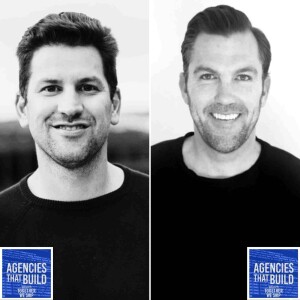
Friday May 12, 2023
Friday May 12, 2023
In today’s episode, we have the privilege of hosting the brilliant minds behind Elva Design, J.P. McCarvel, the Co-founder and Partner, along with Michael Francis, the Co-Founder and Creative Director of this remarkable full-service design group.
Elva Design is on a mission to craft stunning and impactful branded e-commerce experiences, where they seamlessly blend design, technology, and strategy. Get ready to explore their insights on creating exceptional customer journeys and discover the magic that sets Elva Design apart in the world of design.
Discussion Points -
Q1. What misconception bogus strategy do you want to clear up? 2:34Q2. Why did you decide to do a remote? 5:27Q3. Tell us a little bit about your origin story. 6:35Q4. What tools are you using? 8:56Q5. How do you overcome situations when there is friction? 18:41Q6. What are your client acquisition strategies? How do you approach it? 21:13Q7. How do you manage your team and support them in facing difficult challenges? 26:18|Q8. What are the steps you have taken to ensure the team stays smart and up-to-date? 29:40Q9. How did you come up with the name ‘Elva’? 34:37Q10. What's exciting you about the future? 36:05
Show notes -
When we work with partners, we like to act as an extension to their team and constantly communicate and be in conversation with them. - Michael Francis 8:40
Every client is different as far as what they want, as far as what they want out of a partner and what their expectations are, what their culture is, I think my experience at Yeti was, and coming from GoPro and Crocs before that was, agencies come in and tell you the things that they do and how they do them, and why you'll benefit from them. - JP McCarvel 10:05
If you get too big to tailor to or if you just start to do a one size fits all for brands, especially for brands like it's a losing strategy, it will lead to failure. - JP McCarvel 11:31
We’re really coming in humble and just listening to what we've been through as a brand and where we're going. And we try to advocate that to the team today to say- hey, you can, you should go into brands and tell them that you don't know and that you rely on them for that knowledge. - JP McCarvel 13:40
We disagree probably multiple times a day. And you know, it's really around, 1. We both trust each other. We've gotten this far and, 2. Talking about it being open and transparent with what we have issues with. - Michael Francis 19:15
E-commerce doesn't work like that it's messy, and it's very difficult so is running an agency, so just embrace it, and work through some days, sometimes you win, sometimes you lose, but you keep working together to do better the next day. 20:38
Ideal for us, or there are those brands that want to have the best-in-class brand experience for their customer. Now they're focused on what's the digital experience for my customer, and then going out and finding a team that can help support them in that journey - JP McCarvel 21:36
Communication is key, having conversations with them (team), providing support where they need it, whether it's the extra support, buying more time with the client, limiting the number of pages that are due, you know, working with the creative team, first of the design team first, to alleviate any type of stress - Michael Francis 26:36
Finding creative talent for e-commerce design is somewhat of a needle in the haystack to have an understanding of UX and UI, and some lean more on one than the other. And so being open to that type of talent when it presents itself or when it comes in and creating a space for that type of talent on the team. - Michael Francis 30:12
What's exciting is that I don't think the challenges are going away, I think they're getting even more tough to grasp. And for someone like Michael and myself, the thought of things changing and getting more difficult is exciting. 37:04
Myth-busted - The creative agency people have to be in the same room to create the best work.
Links -
JP McCarvel’s LinkedIn: https://www.linkedin.com/in/johnpaulmccarvel/ Michael Francis LinkedIn: https://www.linkedin.com/in/mjfrancis/ Company website: https://www.helloelva.com/
Show Credits - Host - Varun Bihani & Jessie CoanProduced by Bobby Soni Edited by Priyanka Sharma Content by Aakash Damani, Yashika Neekhra, and Juhie Bhardwaj
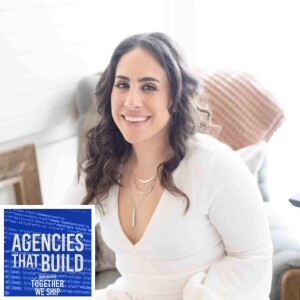
Friday May 05, 2023
Friday May 05, 2023
Alicia Williams, a marketing genius with a passion-infused go-getter personality is the co-founder and creative director at Aliste Marketing. She has collaborated with some of the biggest industry disruptors and executive powerhouses and emerged as a force to be reckoned with in the industry. Since 2008, she has been successfully building a collective of brilliant creatives, strategists, and specialists that produce a truly end-to-end marketing solution for established brands.
Discussion points -
Q1 - What sort of bogus misconception strategy you want to set the record straight on? 3:20Q2 - You guys have a pretty targeted niche, so how did you find that? 5:15Q3 - How do you identify which channels are the right fit? Are there some practical tools and tips that may give us the answer more objectively? 8:24Q4- What are your thoughts on the reemergence of in-person events? 11:14Q5 - Give us a couple of pointers on the practices that have been most effective for you in utilizing LinkedIn. What has it worked for you, and what do you love the most? 15:21Q6 - How do you measure success on LinkedIn? Is there anything that you track that helps you decide? 18:30Q7 - What is your origin story? Can you tell us how you got started? 20:00Q8 - How do you pick your people? How do you vet that they're good? 25:25Q9 - What are the tools that you are using? 33:22Q10 - How do you see your agency going forward? 35:55Q11 - How do you define your audience? And what is the good initiative for you when it comes to growth? 37:54Q12 - What's exciting you about the future? 39:30Q13 - What are your feelings about AI, and how you are approaching it? 41:02
Show notes -
It definitely wasn't a straight line, it was exact bumps and swirly rallies, in order to figure out who our audience was, and also what we really liked doing and what we were good at, and being in a position within our business to say, we're not good at this, or this doesn't bring us joy. 5:37
LinkedIn is a massive treasure chest for me specifically, to get in front of the right people. Like, tell me what platform honestly, you could reach out to the CEO of Pepsi and get a response. 9:20
From a client perspective, it goes back down to who are their buyers, and what’s their buyer persona. What's the age, the industry, the geographic location? Like what do they care about? And that honestly helped guide or does guide where they should be hanging out from a platform standpoint. 10:15
I think in-person events absolutely have a place. And they're great, especially for learning and development, and getting in the room and showing a presence. I'm just very intentional about which ones I go to, I think of it this way, what events are worth me not being home for my family to go to? 12:39
We do have a LinkedIn group that's filled with marketing executives, I measure the growth of that group and the engagement. The other is my connection growth, making sure that my connection numbers are increasing with the right people. And the third is we have a LinkedIn navigator it will show profiles, and engagement is tracked based on others in your space. 18:24
We built the team to really have a collective of different specialists, they are hyper-focused on what they do, and they do it really, really well. Where my strong suit comes in is that strategy and that implementation part and kind of making sure the wheel spins. 22:53
So when I say I've spent years building this collective, it has taken years to test it, try it, and have them treat me like a customer, before I introduce them to a client. 27:09
Our clients know, our strong suit is the strategy and implementing the creative part. The other avenues like SEO and ads, are specific contractors that we pull in for that client. 29:47
Clients want to know, their goals are being hit, the work is being done, we have their back, and who's sitting in those seats. It's irrelevant because they trust that we're building the team that's gonna get them there. 33:04
Clients and brands that are going through a transition that have a marketing executive in house already, that's who's a really good fit for us from a brand perspective. 38:46
You don't need to have a huge website, you could have a basic website, get you started, and it achieves the goals, you could use the AI tools to help you in terms of getting content going and wordsmithing and whatnot. 40:32
Myth Busted - Being on every social media platform instead of just focusing on where your audience is and doing that platform really well.
Links -
LinkedIn: https://www.linkedin.com/in/aliste/
Instagram: https://www.instagram.com/alistemarketing/
Company website: https://alistemarketing.com/
Show Credits -
Host - Varun Bihani & Jessie Coan
Produced by Bobby Soni
Edited by Priyanka Sharma
Content by Aakash Damani, Yashika Neekhra, and Juhie Bhardwaj
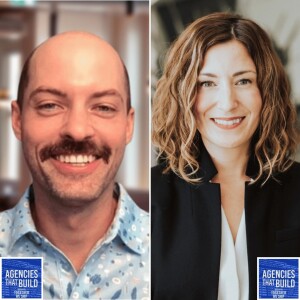
Monday Apr 24, 2023
Monday Apr 24, 2023
Today we are joined by two special guests who run a very successful agency together - Garrett Winder, Owner & Ariel Kidwell, Director of Strategy at Goodwork. They are a team of expert developers helping design agencies build things for web and mobile.
Garrett has a proven track record for leading high-quality large-scale web projects for clients like PBS Frito Lay and Tito's handmade vodka and Ariel is a seasoned marketer and consultant who specializes in helping businesses achieve sustainable growth.
Discussion points -
Q1 - Smash a myth, bogus strategy, or misconception. What do you guys want to set the record straight on? What do you want to clear up? 2:19
Q2- A lot of agency struggles with managing expectations, how do you manage those boundaries? Are there some tips and tricks that you can share that you guys have found that make it work? 03:36
Q3- When the clients start getting angry or agitated because of the deadlines not being met, How do you handle such a situation? 7:51
Q4 - How do you make sure that your clients deliver what they owe you so you can stick to that timeline without padding it so much? 13:21
Q5 - How your experience has been in working with the other agencies? How the relationship has been? What did you enjoy more? What were the pros and cons, of working with each of them, like, what are the wins? And what are the losses for you? 15:34
Q6 - Do you have you know, a process in which you make sure that your team is have been utilized for a certain amount of time when the institution happens? 20:21
Q7 - How do you work with the team, outside of email and phone calls and stuff like that? Are there tools that you guys have found that you've used? 22:56
Q8 - How do you tackle your quality checks? 30:08
Q9 - How did you start this business? How did you get into this? What's your what's your origin story? 32:52
Q10 - What's exciting you about the future? 34:52
Show notes -
We really focused on process, because we figured process has to at least be the foundation for that, right? Like, you have to be able to have expectations not only within your company but also setting them with clients so that everyone can at least start aligned. - Ariel Kidwell 05:17
If you really sit down and have a thorough gut check with your team on what's realistic, and also with the client. What's realistic for them? When can they deliver the materials that you need? When can they do realistic QA turns and content entry, you can kind of set these milestones and timelines that are achievable- Ariel Kidwell 06:11
Wishful thinking is one of the worst things you can do in our industry because it rarely happens the best way, you always have to be proactively working towards the worst-case scenario. - Ariel Kidwell 09:18
We do have a pause clause, so there's a certain amount of time, but if they don't get back to us, we just say, we're going to take it off of our schedule, we'll move on with the other things we're working on. - Garrett Winder 14:00
They (agencies) could say, Hey, we're doing this in July, and July comes around, and they say, actually, we're doing it in November. And all of a sudden, we have a hole in our schedule. So that would be one of the one of the dark side of working with the agencies. - Garret Winder 17:32
We found that the more we work with these agencies, the more we learned from each other, the more they really appreciate the more we give them to help make the project better. - Ariel Kidwell 18:55
We actually moved from Trello to GitHub for so that these projects are tied to the code changes, which helps us a lot because our clients are long-term. You know, something can happen in two years where we kind of want to look back and see oh, that was this project and we touched to this thing. - Garrett Winder 24:58
A tool that I use that I've told so many of our agency friends about and they love is called To Do. It's an app, you can have it on your phone, you can use it in the browser, it's so simple, but it can help so much keep track of all the little emails and status updates. - Ariel Kidwell 26:35
As clients get more advanced and mature with websites in general, we keep seeing that relationship between us and them change.- Garrett Winder 37:01
Myth Busted - Agencies have to be chaotic, stressful, and reactive in order to keep their clients happy.
Links -
Garret’s LinkedIn: https://www.linkedin.com/in/garrettwinder/
Ariel’s LinkedIn- https://www.linkedin.com/in/arielkidwell/
Company website: https://www.simplygoodwork.com/
Show Credits -
Host - Varun Bihani & Jessie Coan
Produced by Bobby Soni
Edited by Priyanka Sharma
Content by Aakash Damani, Yashika Neekhra, and Juhie Bhardwaj
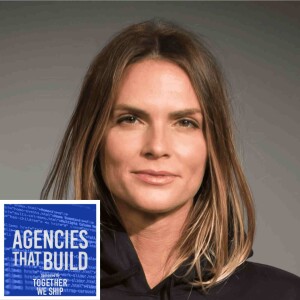
Friday Apr 14, 2023
Friday Apr 14, 2023
In this episode of Agency That Build, we are joined by CEO, Founder at Backroom, Kara Redman. She is a marketing wonder and skilled question-asker and a problem-solver. She founded her own business in 2014, a brand strategy and activation agency after working in marketing for more than 15 years. She empowers a four-day workweek by dismantling the 9 to 5 workday routine. A humanist in a true sense.
Discussion points -
What is some sort of myth, bogus strategy? Something you misconception something you want to set the record straight on? 2:16
Was there somebody in your past who was like a mentor and influenced your journey? 4:48
What is the whole idea of impostor syndrome and the learnings from the mentors, how do you implement these learnings in the in the way you are? 7:00
How do you define humanist? How being a humanist can help you be more successful. 9:52
How you guys work within that four day work week? How you make that work? 14:02
How do you take on new clients and type of work? Does the 4 day work week change anything for you on the type of work that you do? 18:05
What are the tools and PM system you are using? Can you divulge the tools in your suite? Will you share that secret sauce? 23:59
What are your thoughts on employee retention? How do you keep the your team engaged and inspired? 29:28
What is exciting you about the future? 37:24
Which your favourite tool? 38:33
Shownotes -
If you're open to always learning and being curious and growing over being right, or being admired, then the world is your mentor. 6:11
You get more out of people, when you meet them where they are on an emotional level, versus trying to force somebody to produce from fears, scare tactics, intimidation hierarchies. 10:50
We just set appropriate expectations, manage those expectations, follow through and show up and do the work. You don't have to cram everything in. 16:38
As a society, we learn when we speak about the things that we're trying and doing and what works and what doesn't. 21:05
Our rule is all documents are stored in Drive, you can link to them in Asana, we do all of our collaborative work in either mural or figma. 25:30
Employee retention should never be a goal, because to me, it implies a mentality of ownership. 30:00
We're really excited to see how AI continues to influence the work that we're doing. Like, for example, we're using AI for, like creative concepting right now, rather than doing like bespoke creative campaigns, and then, you know, creating based on what the clients sign off on. So, you know, we're really excited just to have more tools. 38:12
Links -
LinkedIn: https://www.linkedin.com/in/kararedman/ Twitter: https://twitter.com/backroom Instagram: https://www.instagram.com/backroom.io/ Company website: https://www.backroom.io/ Medium: https://medium.com/@kararedman
Myth Busted - The idea of a self-made man, there is always somebody who gives the first opportunity. Show Credits -
Host - Varun Bihani & Jessie CoanProduced by Bobby Soni Edited by Priyanka Sharma Content by Aakash Damani, Yashika Neekhra, and Juhie Bhardwaj







